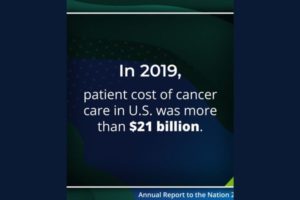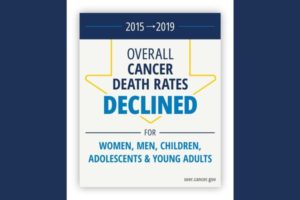
W. Kimryn Rathmell, MD, PhD, began work today as the 17th director of the National Cancer Institute (NCI), part of the National Institutes of Health (NIH). A renowned kidney cancer expert and influential leader in cancer research and patient care, Dr. Rathmell was selected by President Biden to succeed Monica M. Bertagnolli, MD, who left NCI to become the NIH director on November 9.
“I want to officially welcome Dr. Rathmell to the National Cancer Institute on her first day as director,” said Department of Health and Human Services Secretary Xavier Becerra. “Dr. Rathmell begins her new role at an important time. The President and First Lady reignited the Biden Cancer Moonshot℠ to dramatically accelerate progress in the fight against cancer—and NCI is helping to lead the charge. Dr. Rathmell brings decades of experience helping to advance research and drive innovation to improve care for patients. She joins an extraordinary team already doing great work to prevent, detect, and treat cancer to make sure Americans are living longer, healthier lives. I look forward to working closely with Dr. Rathmell in the months and years ahead to help end cancer as we know it.”
“I am thrilled to welcome Dr. Rathmell to NIH, and I know she is the right leader at the right time for NCI,” said Dr. Bertagnolli. “She is a fantastic combination of researcher and clinician who deeply understands the process of translating lab research into effective cancer treatments. NCI is in great hands to actualize the brighter future we all want for people with cancer.”
Dr. Rathmell comes to NCI from Vanderbilt University Medical Center in Nashville, Tennessee, where she served as the Hugh Jackson Morgan Chair in Medicine, chair of the Department of Medicine, and physician-in-chief. Before joining Vanderbilt University, she served on the faculty of the University of North Carolina at Chapel Hill.
Dr. Rathmell is an accomplished physician–scientist, from treating patients with kidney cancer to conducting research that has advanced how scientists understand the molecular and genetic drivers of the disease. For example, as a member of The Cancer Genome Atlas, a joint effort of NCI and NIH’s National Human Genome Research Institute to catalog genetic mutations of cancers, Dr. Rathmell contributed to the discovery that a rare form of kidney cancer called chromophobe renal cell carcinoma is caused in part by mutations in mitochondrial DNA. More recently, her genomic studies have led to the identification of new molecular biomarkers to help detect and treat kidney cancers earlier.
An advocate for research into rare forms of kidney cancer, such as renal medullary carcinoma (RMC), Dr. Rathmell co-founded the nonprofit organization RMC Alliance, which supports patients with renal medullary carcinoma. This rare form of kidney cancer predominantly affects young adults and adolescents of African descent who carry one copy of the sickle cell hemoglobin gene.
In addition to publishing hundreds of scientific articles about her research studies, Dr. Rathmell has also published on ethical issues such as cancer drug shortages and conflicts of interest in scientific publishing. Beyond her research interests, she is deeply committed to mentoring and developing the next generation of physician–scientists.
“I have held NCI in the highest regard throughout my experience as a cancer researcher, translational investigator, practicing clinician, and educator,” said Dr. Rathmell. “This opportunity to help the institute achieve greater heights for progress against cancer is an incredible honor.
“With all of today’s advances in technology and science, and the truly talented and committed people at NCI and across the cancer research and care community, I believe it is possible to end cancer as we know it in our lifetime,” she continued. “We must empower early-career and established scientists from diverse backgrounds so they can work together and break down barriers to deliver the biggest, boldest science possible and produce advances that benefit everyone who faces cancer. We have an extraordinarily talented and committed workforce, and I know we are up to the challenge.”
Dr. Rathmell, who will lead NCI in pursuing the goals of President Biden’s Cancer Moonshot initiative, has served on NCI’s Board of Scientific Advisors since 2018. She was elected to the National Academy of Medicine in 2022 and to the American Academy of Arts and Sciences in 2023. She served as president of the American Society for Clinical Investigation in 2019.
Dr. Rathmell earned bachelor’s degrees in biology and chemistry from the University of Northern Iowa in Cedar Falls, Iowa. She received a PhD in biophysics and an MD from Stanford University in Palo Alto, California. She completed an internal medicine internship at the University of Chicago and a residency and fellowship in medical oncology at the University of Pennsylvania in Philadelphia. In 2022, she completed a Master of Management in Health Care from Vanderbilt’s Owen Graduate School of Management.
With Dr. Rathmell’s arrival, Douglas R. Lowy, MD, who has been serving as NCI’s acting director, will resume his role as principal deputy director of NCI and will continue his work as chief of the Laboratory of Cellular Oncology in NCI’s Center for Cancer Research.
About the National Cancer Institute (NCI): NCI leads the National Cancer Program and NIH’s efforts to dramatically reduce the prevalence of cancer and improve the lives of cancer patients and their families, through research into prevention and cancer biology, the development of new interventions, and the training and mentoring of new researchers. For more information about cancer, please visit the NCI website at cancer.gov or call NCI’s contact center, the Cancer Information Service, at 1-800-4-CANCER (1-800-422-6237).
About the National Institutes of Health (NIH): NIH, the nation’s medical research agency, includes 27 Institutes and Centers and is a component of the U.S. Department of Health and Human Services. NIH is the primary federal agency conducting and supporting basic, clinical, and translational medical research, and is investigating the causes, treatments, and cures for both common and rare diseases. For more information about NIH and its programs, visit nih.gov.



